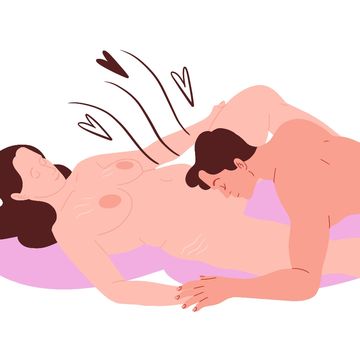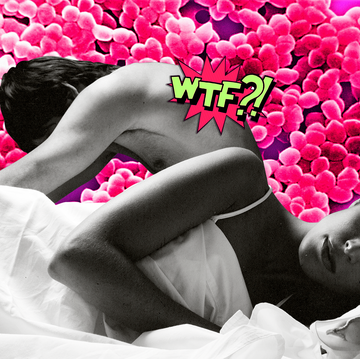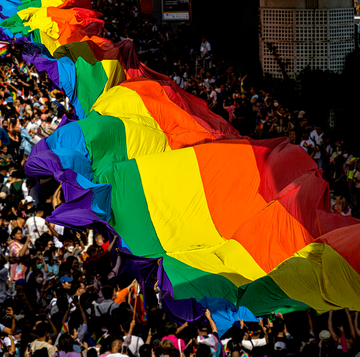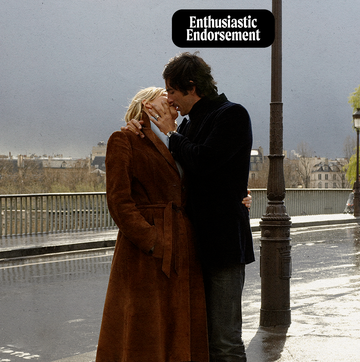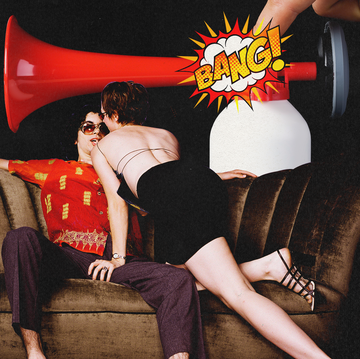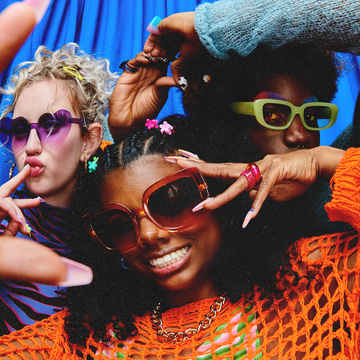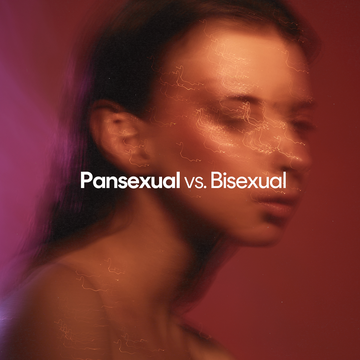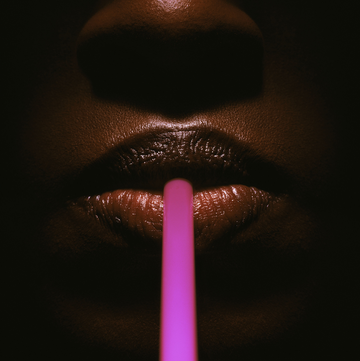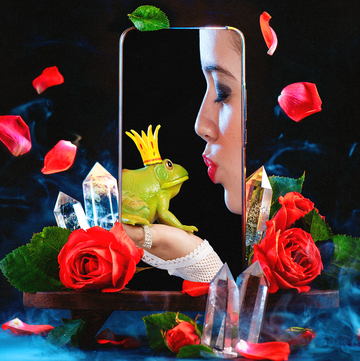"Is that for you?" The waitress asks, glancing first at my beer, and then at my eight-months-pregnant belly. Based on her side-eye, you'd think I were Betty Draper resting a martini on my bump with a cigarette dangling out of my mouth.
"Yep," I say, smiling brightly. This apple-infused craft beer — "sippy cup juice for adults," per the menu — is all mine. It's still taboo in the U.S. — plenty of women I know who had a little wine during pregnancy wouldn't say so on the record. "I don't need to be the face of pregnant drinking on the Internet," one friend, who had sipped sangria at nine months, told me. But in the spirit of demystifying what can feel like a dirty little secret, I'm willing to say I drank — occasionally and lightly — during my pregnancy.
Beginning at around 16 weeks (my daughter's now 9 months old), I began drinking small amounts of alcohol — maybe a glass or two of wine or a couple of beers per week. On a pre-baby trip (let's not call it a "babymoon"), I nursed a glass of wine over a long dinner. If I felt like a Blue Moon at a bachelorette party, I had one — and then no more for the rest of the day. (I applied the same principle to boxes of Milk Duds and other junk food.) Plenty of weeks I didn't drink any alcohol at all. I never binge drank or got drunk, and I never drank liquor.
Still, the waitress wasn't alone in her disdain. Relatives raised eyebrows. Family friends didn't put a wine glass by my place because they assumed I wouldn't be using it. "Why risk it?" is a popular question posed to a pregnant woman sipping a half-glass of Cabernet. That's just it: I knew that drinking heavily during pregnancy would be a terrible thing and could cause Fetal Alcohol Syndrome, but I didn't — and still don't — think I was risking my baby's health by drinking small amounts on a sporadic basis. If I thought I were putting her at risk, I would never have done it.
It turns out I'm part of the group of American women who is most likely to have a ceremonial glass of wine during pregnancy. College-educated, employed women in their late 30s (I am all of these except that I'm in my early 30s — 31 for most of my pregnancy last year) are more likely to "non-binge" drink — a few drinks per week — during pregnancy than any other group. Fourteen percent of pregnant women ages 35 to 44 report drinking in moderation, compared to 7.6 percent of pregnant women overall, according to the latest Centers for Disease Control study. That study also found that drinking lightly during pregnancy is also more common among college graduates and employed women — 10 percent of both groups report doing it. The data suggests drinking while expecting is an "elite" thing. For more proof, consider that Patron Saint of Organic Mothers Gwyneth Paltrow sipped Guinness in 2006 while pregnant with Apple (andgot shit for it online).
These (we?) women have been the most likely pregnant drinkers dating back to 1991 — but the CDC can't quite explain why, saying, "further research is needed." Why do more older, educated, employed women drink conservatively while pregnant, despite the Surgeon General's official warning against it?
Because they're "older," they may be more accustomed to having a casual drink at lunch or with dinner, and less willing to give the habit up. Some women are bolstered by family history, recalling that their grandmothers and mothers drank and smoked — and here we all are. But in my experience, these (we?) women are more likely to drink because they consider themselves, however arrogantly, smart enough to question the American medical standard.
Severalforeign studies have all but endorsed low to moderate amounts of alcohol during pregnancy. A much-cited 2012 study from the Danish National Birth Cohort, funded in part by the CDC, found having anywhere from 1 to 8 drinks per week at any point throughout the pregnancy had no negative neurological effect on children at age 5. Two prominent studies out of Australia and the U.K. (which tracked children's development to age 14) found that low to moderate drinking while pregnant didn't result in birth defects or long-term behavioral problems. (Heavy drinking, again, revealed harmful cognitive and developmental effects, ranging from low attention span to Fetal Alcohol Syndrome.)
"So far I haven't seen anything that says I'll hurt my baby by having a couple of drinks a week," said Lindsay Timlin, a 32-year-old attorney in New York who began drinking a couple of glasses of wine per week after her first trimester of pregnancy. Now the mom of a two-month-old son, she says, "I can go without alcohol for nine months — but absent any conclusive evidence that it's going to harm my baby, I just don't see a good reason to."
Pregnant women who drink lightly in 2014 don't necessarily feel like rebels who are tempting fate. They simply believe that there is a secret code among them — that an occasional drink really is OK, but it's just too risky for many American doctors to share that with most of their patients.
"That would be too much of a liability," an ob-gyn at a highly respected hospital who asked to remain anonymous told me. What if something went wrong and a patient did go overboard? Medical malpractice is at an all-time high. This OB drank in moderation during her own pregnancy, and quietly told friends it was fine to do the same. Those friends are members of the pregnant-drinking demo. "On average, obstetricians are more likely to tell [those women] it's OK," Emily Oster, an associate professor of economics at the University of Chicago, told me.
While researching her controversial bookExpecting Better: Why the Conventional Pregnancy Wisdom Is Wrong and What You Really Need to Know, Oster said that many doctors seemed to agree that a random glass of wine on a weekly basis probably isn't harmful, based on anecdotal experience and perhaps the foreign research too. But she also said she got the impression from doctors that they trust older, professional, more educated women with this inside information because doctors assume those women will actually keep pregnant drinking under wraps, whereas the general population might interpret the OK to have one glass of wine as a slippery slope to have more.
Unfair as that assumption may be, "the concern (which was expressed to me over and over again by doctors)," Oster writes in Expecting Better, is "that if you tell people they can have a glass of wine, they'll have three (or one giant bowl-o-wine). ... Better to say you can't have any, as that rule is easy to understand."
This is the drumbeat of many pregnant drinkers (admittedly, myself included) — that they're privy to the inside info that doctors only tell their friends. For this reason, I never asked my doctor to sign off on my occasional drink during pregnancy. Writing that smacks as irresponsible, but the truth is that if my doctor told me I couldn't, I'd believe she was just telling me what she's supposed to. I asked an ob-gyn friend instead, because I knew that, in private, friend to friend, she would give me the truth. She said a drink here or there is completely fine.
"I remember a nurse friend telling me, 'We can't trust most people to drink in moderation, so they tell them not to do it at all,'" Josie Ortega, a 30-year-old mom from Nashville, Tennessee, told me. She drank lightly — at cocktail parties or after dinners with her husband — during pregnancy with her two daughters, now 8 months and 2 years old. ("I'm officially pregnant, drinking wine and unashamed," Ortega tweeted last year, linking to a preview of Oster's book in the Wall Street Journal.)
Oster became a fairy godmother among pregnant women (and pissed off lots of ob-gyns) with that preview, which pointed out that "modern pregnancy comes with a long list of strict rules, but does it have to?" Pregnant women are initiated not only with sonogram pictures that only a mother could decipher ("look, there's his penis!") but also a litany of things they shouldn't do (smoke cigarettes, gain too much weight, intense cardio) or ingest (alcohol, caffeine, deli meats, sushi, unpasteurized cheese). But the basis of the advice is murky, and varies depending on which doctor, book, or medical journal you ask. A couple of cups of coffee a day are believed to be OK, although some studies say they can cause miscarriages. Some of my friend's old-school doctors told them not to go to spin class — my doctor said it was perfectly fine. And a couple of glasses of wine per week have been provensafe by some studies, except most doctors tow the line that there's "no safe amount."
Instead of taking the draconian rules at face value, Oster called bullshit — in a data-driven, economist sort of way, of course. She broke down hundreds of studies, weighing those with high sample sizes that studied women and their children over the course of many years more highly than short-term studies with smaller sample sizes (to paraphrase her method, which is surely more detailed). She found that not all deli meats or cheeses are created equally poisonously, but deli turkey and queso fresco, specifically, are responsible for the most cases of listeria. And she found that capping coffee at two cups was a random rule, as there is no data to show that a third cup caused more miscarriages. As for alcohol, "When I looked at the data from hundreds of studies, I found, basically, no credible evidence that low levels of drinking (a glass of wine or so a day) have any impact on your baby's cognitive development," she writes in Expecting Better. I was drinking far less, which offered me some validation.
"I think occasional drinking is more common during pregnancy in the United States than we are led to believe," Oster adds. "It's like a secret code."
And the code is passed on among the statically proven demo of thirtysomething, educated, employed women. Before I got pregnant, I watched expecting friends (yes, college-educated, professionals in their 30s) have a glass of wine at a group dinner or clink mimosas at a baby shower. They assured each other it was OK every now and then. One mom friend's pre-baby regimen included daily swimming and prenatal vitamins, weekly Pilates, and the occasional glass of wine or beer to help her de-stress. These women had healthy pregnancies and delivered healthy babies. Their anecdotal experience seemed like proof positive. It wasn't the only reason I followed suit, but it helped make me feel better about having that glass of Champagne at my own shower.
Timlin said she felt more comfortable drinking during pregnancy after seeing friends, including doctor friends, who did the same. Enjoying a glass of wine at work-related social events in particular made her feel less like the token pregnant lady and more like … herself. "The alternative might be to drink Diet Coke at one of those events, and frankly, I don't think a Diet Coke is any better for me than alcohol," she said.
Still, if occasional drinks really aren't harmful, why is drinking while pregnant effectively banned in the U.S.? "Medicine is based on evidence and controlled trials, and we will never have those on this subject," Dr. Doerthe Brueggman, an ob-gyn and assistant professor of clinical research at USC's Keck School of Medicine, told me. It would be unethical to conduct a traditional study in which scientists give a control group of pregnant women no alcohol and other groups increasingly higher, increasingly risky amounts. Somewhere in between a glass of wine a week and 12 glasses of wine a week may be the tipping point — but no pregnant subjects nor researchers would threaten their pregnancies to find out what it is. (The aforementioned foreign studies gather data by asking pregnant women about their existing drinking habits, not necessarily controlling them in a lab.)
Even so, Dr. Brueggman says more of her patients and readers of her online health magazineHealth Goes Female than ever before are asking her, "'Can I drink a little bit?' They've heard it in the media that they can." Particularly the pregnant drinking demo, she said, seems to think "'it's under control, I'm educated, I know the data.'" (She flatly advises patients against it.)
Josie Ortega says that some of the supportive data around drinking during pregnancy confirmed her instinct to do it. But mainly, she says she indulged in an occasional glass of wine during pregnancy "for the same reason you're eating chocolate," she said. "It's a treat for you."
It was a treat for me too. Even though I was comfortable with my decision, at times I still felt a little guilty about it. In this moment of attachment parenting, when moms are breastfeeding their kids practically until their prom, the unspoken rule is that the more you suffer and sacrifice, the better you are as a parent. ("Oh, you're not regurgitating your son's food? For shame!") Choosing to have the occasional michelada during pregnancy, giving yourself a break, doesn't gel with all of that.
One smart mom who I respect asked me, "What's the benefit?" to drinking, even conservatively, during pregnancy. She was implying there couldn't possibly be any. But I believe I did benefit, mentally and physically, from maintaining as much of my normal life as possible during pregnancy. I cut out sushi, deli meats, high-mercury fish like tuna and unpasteurized cheese (save a nibble here or there). But after doing my research, and talking to my doctor about my concerns, I didn't swear off spin class or coffee or a fairly loud concert on New Year's Eve or pretty vigorously doing the "Gangnam Style" dance at my best friend's wedding. And I didn't swear off the occasional drink either. All of these things in moderation, not just alcohol, made me feel less anxious and more excited about the life-changing new chapter ahead, as if I didn't have to overhaul everything that was normal to me just because I was pregnant. I had my moments (fear, self-doubt, sheer confusion at growing a bra-cup size overnight), but even as my body and life morphed before my eyes, I mostly felt happy and healthy.
Almost a year later, I'm blessed (literally, no snarky hashtag) with a daughter who is, too — she's strong-willed, screechy, and so smiley, she could melt an icy heart. I'll pour a glass of red and say cheers to that anytime.
Follow Michelle on Twitter.


